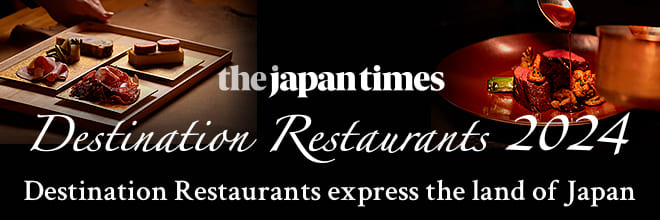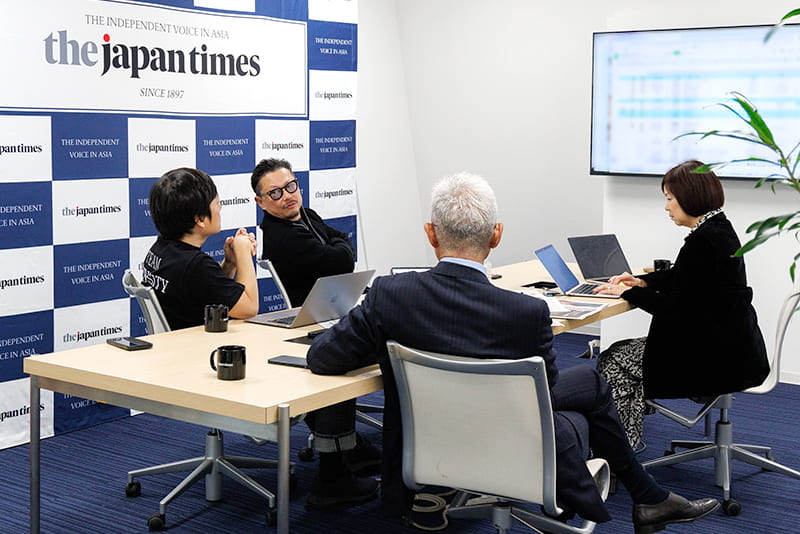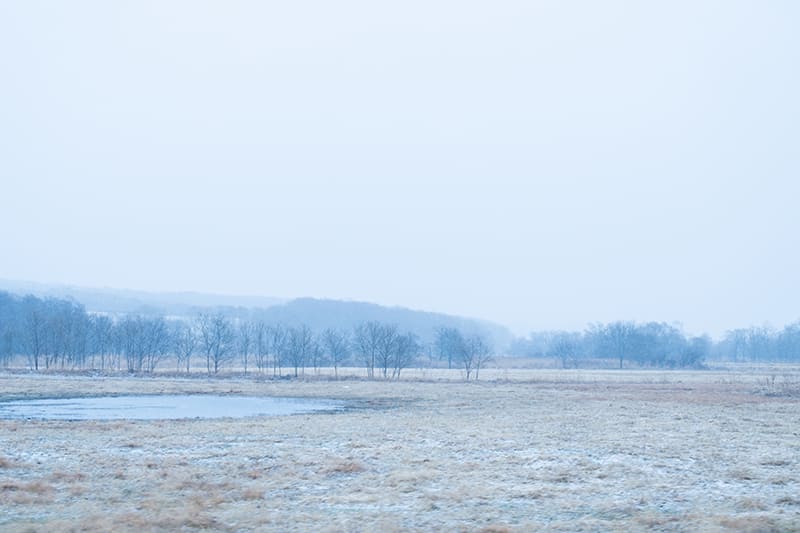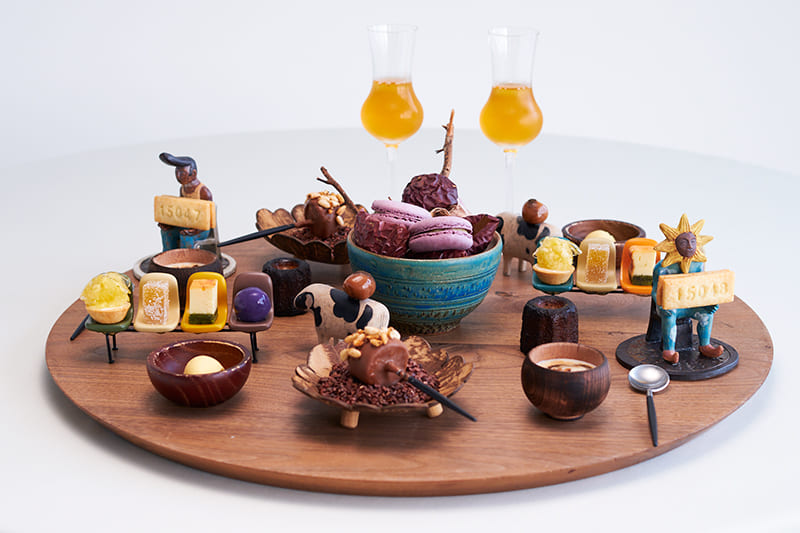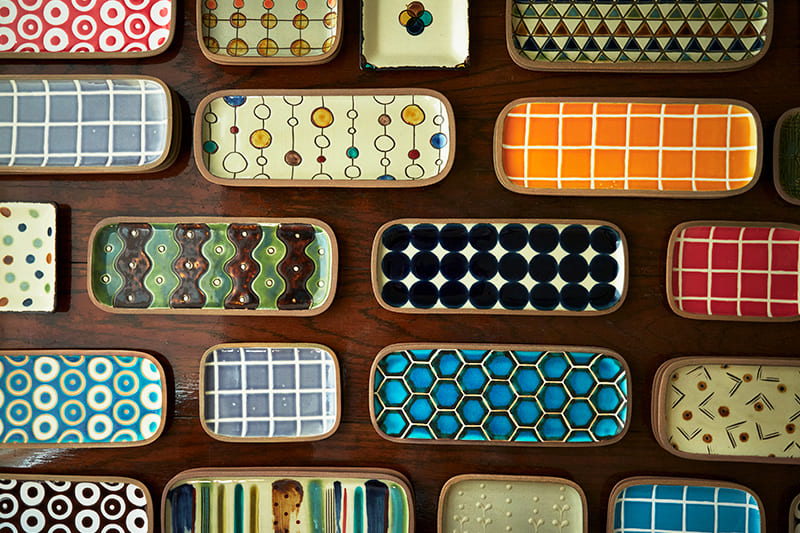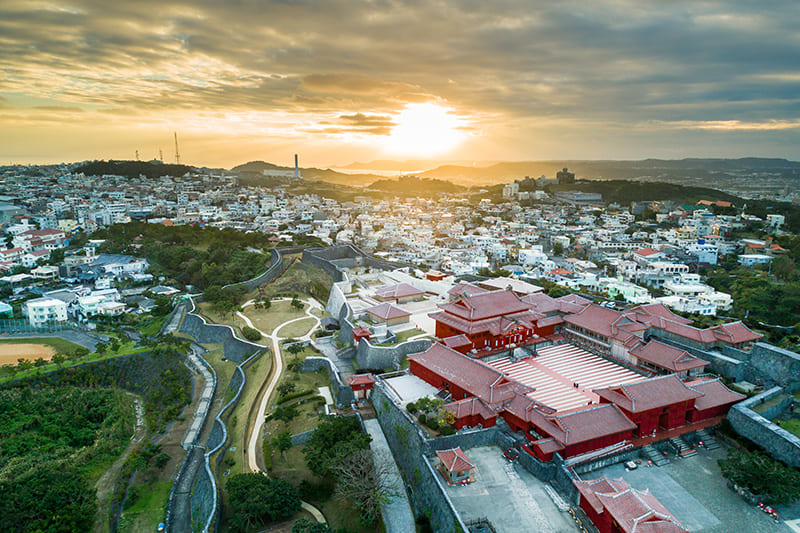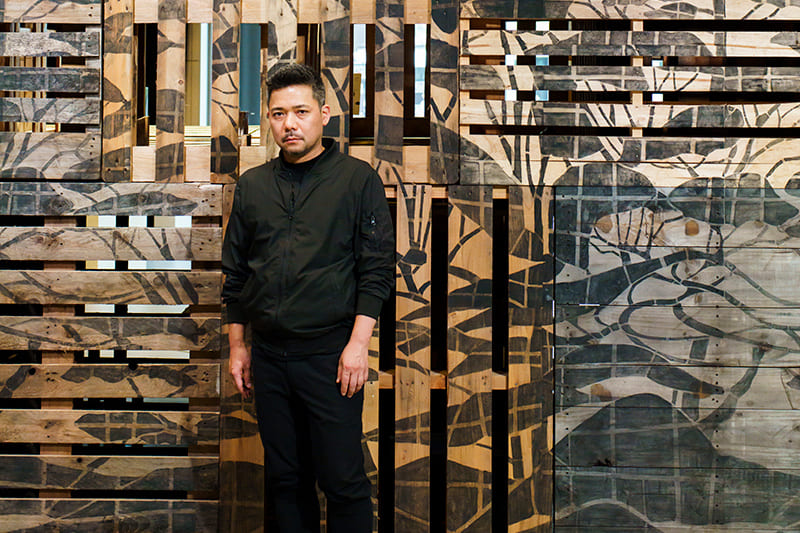April 25, 2025
French restaurant explores Okinawan ingredients
Destination Restaurants 2024
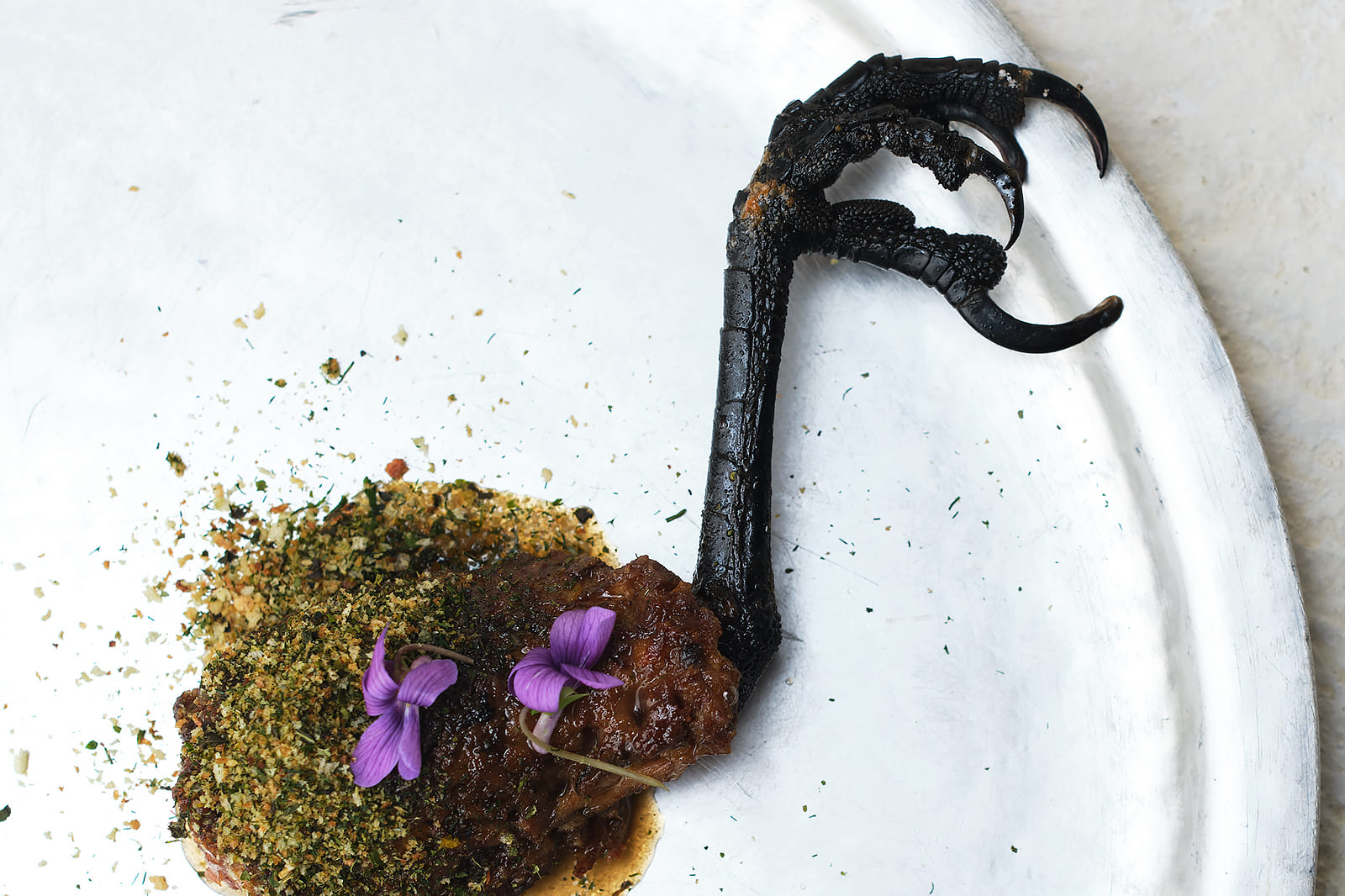
PHOTOS: TAKAO OHTA
The enigmatic French restaurant Mauvaise herbe keeps its phone number and address unlisted, disclosing its location in the Okinawa city of Uruma only after a reservation is made online. A little over an hour’s drive from Naha Airport, it lies in an area packed with small Japanese-style bars — certainly not a location where you would expect to find a gastronomic restaurant.
Chef-owner Keiji Ojima explained his reason for choosing the site: “This is one of the narrowest parts of Okinawa’s main island from east to west, and both the ocean and the mountains are close by, so it’s easy to go and obtain ingredients.”
Born in Miyagi Prefecture, Ojima was raised in the Kanto region and Shizuoka Prefecture and trained in Tokyo. Along the way, he worked in Okinawa and felt an affinity for the region. After living and working in France for three years, he moved to Okinawa. In 2008, he launched the catering business Namae no Nai Ryoriten (Nameless Restaurant).
By the time he opened Mauvaise herbe, a restaurant with nine counter seats, in 2021, he was rumored to be the chef with the deepest knowledge of Okinawan ingredients. He said this came about because he had been perplexed by the scarcity of local ingredients available on the local market, and this motivated him to build closer connections with producers. Today he even accompanies fishermen on their boats, where he uses a technique called shinkeijime (literally, nerve-tightening) to preserve the freshness of the just-caught fish. He also goes on hunts with hunters and then processes the meat in his own slaughterhouse.
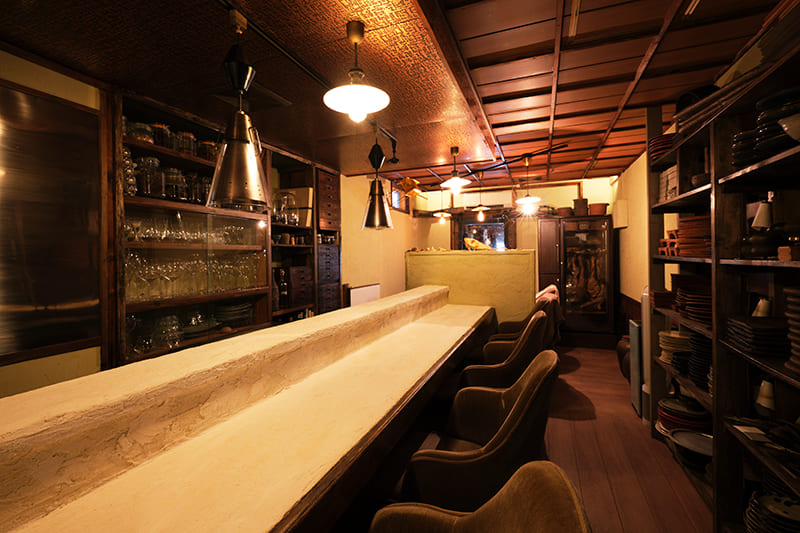
Mauvaise herbe
Address and phone number are unlisted.
https://mauvaiseherbe.okinawa.jp/
Mauvaise herbe’s course menu, costing ¥22,000 ($145) including tax, is truly the product of Ojima’s deep exploration of Okinawan ingredients. What is more, no salt is used in his dishes, except for the salt in the butter served partway through the meal. He said, “Six years ago, I realized that my ego emerged the moment I used salt. In my way of thinking, Mauvaise herbe is not a setting for self-expression. I want to make it a place that embodies the universe, tenchijin” — the concept of heaven, Earth and human beings — “and the energy of the people involved in producing the ingredients, together with the diners. When I think about it that way, salt becomes unnecessary.”
Ingredients such as shellfish liquid and squid intestines do naturally contain salt, and Ojima also makes wide-ranging use of his original vinegar, produced from fermented Okinawan Chinese cabbage and apple peel. In cooperation with producers, he is currently involved in the production of Ayahashi beef, a process in which cows that have been retired from calf-bearing and would normally be euthanized are refattened for two years before their meat is sold. Ojima’s Ayahashi beef roast is made without the use of salt or sauce. Instead, it is coated with vinegar and seasoned with the bitter and sweet flavors produced by pan searing.
It could be said that salt-free cooking is a cutting-edge method in French cuisine that has been practiced in pursuit of lighter, healthier dishes since the nouvelle cuisine movement began in the 1960s. What does it mean to make the most of local ingredients? Mauvaise herbe inspires us to think deeply about this question.
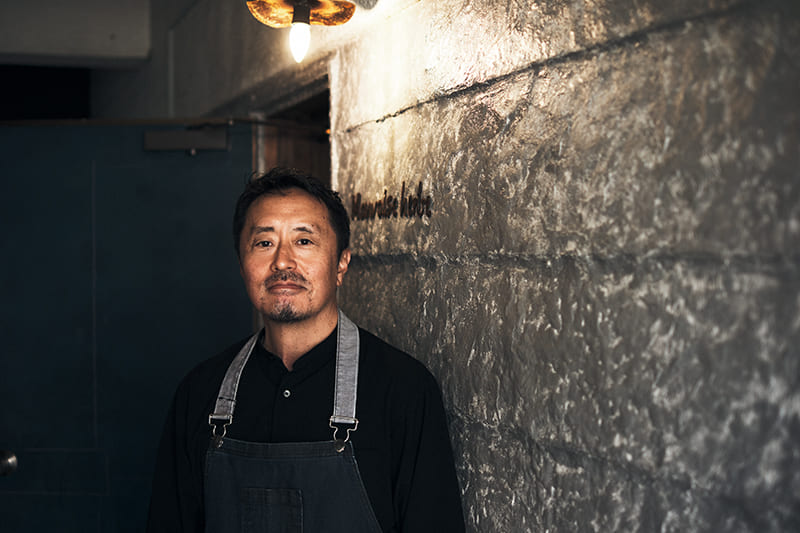
KEIJI OJIMA
Born in 1970 in Miyagi Prefecture, Ojima was raised in the Kanto region and Shizuoka Prefecture. At the age of 25, after working for three years at an airline company, he decided to pursue a culinary career. He worked at French restaurants in Tokyo and Okinawa, then spent three years refining his skills in France. After returning to Japan in 2003, he moved to Okinawa and launched the traveling catering service Namae no Nai Ryoriten (Nameless Restaurant), offering French course-style cuisine made exclusively from Okinawan ingredients. In 2021 he converted his food preparation atelier into a restaurant with counter seating, which he opened with the name Mauvaise herbe.
沖縄で、食材の可能性を追求するフレンチ。
電話番号も住所も非公開というフレンチレストランが沖縄にある。『モヴェズ エルブ』は沖縄本島中部にある、うるま市のスナックが密集するエリアにある。意外な場所だが、オーナーシェフ、小島圭史は「海にも山にも近いので、食材をとりに行きやすい」とこの地を選んだ理由を語る。
宮城県で生まれ東京で修業をしたが、3年間の渡仏生活後、沖縄に移住。2008年にケータリング専門店を開業し、2021年、『モヴェズ エルブ』を開店。小島は漁師と船に乗り、その場で魚の神経を締め、猟師の狩りに同行し、自ら肉を処理する。基本的には料理に塩は使わず、白菜で作る自家製の酢を多用する。
また、現在、小島が生産者と協力して、本来、廃棄される予定だった経産牛を肉牛農家で再肥育し、食材として流通させる、あやはし牛も扱っている。
フランス料理の最先端とも言える塩を使わない小島のスタイルは、地域の食材を活かすとはどういうことなのか、改めて考えさせてもくれる。
Return to Sustainable Japan Magazine Vol. 47 article list page


